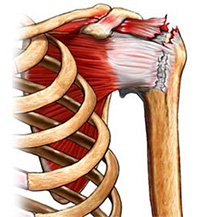A common cause of shoulder pain is shoulder impingement syndrome. Risk factors for impingement of the shoulder tendons or bursa include:
- Overhead activity of the shoulder
- Repeated activity
- Overuse of the joint
- Bone abnormalities
- Joint abnormalities
Shoulder impingement is possible if the shoulder joint is overused in activities such as lifting, tennis, painting, swimming and other overhead work or sports.
Shoulder impingement symptoms
The pain of shoulder impingement is persistent. Daily activities, like putting on a coat, can be painful and difficult. Any motion reaching overhead or up behind the back may cause pain.
Shoulder impingement can lead to two conditions:
- Inflammation of the rotator cuff tendons (tendinitis).
- Inflammation of the bursa (bursitis).

Weakness and pain of the arm and shoulder muscles is a common symptom.
If left untreated, the shoulders rotator cuff tendons can become thin and tear. Injury of the tendons over time can have serious consequences - the tendon can tear in two, causing a rotator cuff tear that makes it difficult to elevate the arm. Bicep muscles can rupture as a result of the ongoing impingement process.
Shoulder impingement diagnosis
The shoulder specialists at Southern Joint Replacement Institute (SJRI) in Nashville will examine your medical history and perform a physical exam. X-rays will be done to rule out arthritis or other conditions, and may reveal bone spurs, changes in bone contour and even injury of the muscle.
Shoulder impingement syndrome treatment
The most common treatment for shoulder impingement is an oral anti-inflammatory medication, such as naproxen, ibuprofen, or aspirin for a duration of six to eight weeks. If one anti-inflammatory medication does not alleviate symptoms in 10 to 14 days, your SJRI doctor will prescribe another one until relief is achieved.
Cortisone-type injections may be prescribed if persistent symptoms do not respond well to anti-inflammatory drugs.
Your SJRI doctor may also apply these treatments in addition to medications:
- Daily stretching in a warm shower
- Exercises to strengthen and stretch shoulder muscles that you can perform at home
- Temporary avoidance of certain motions and repetitive activities with your injured arm
- Physical therapy
Most patients respond well to these treatments.
Significant weakness or other symptoms that persist regardless of treatment may indicate a rotator cuff tear. Your doctor may order an ultrasound, arthrogram or MRI to rule that out. A torn rotator cuff may require surgery.
For more information or to make an appointment, call (877) 442-SJRI (7574).